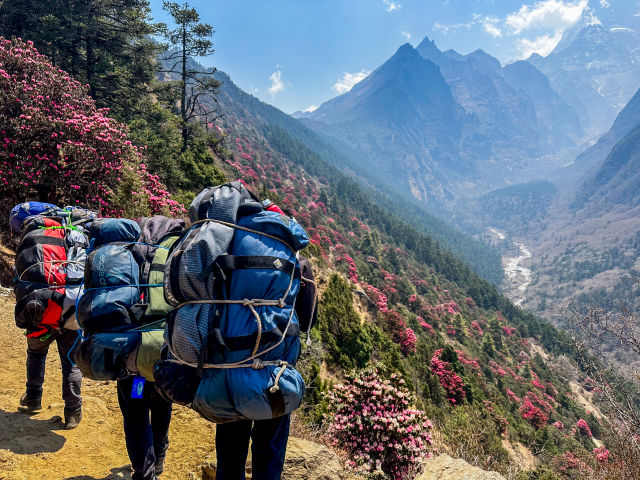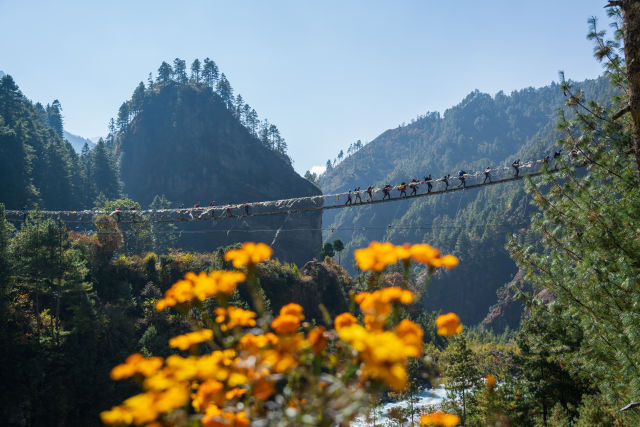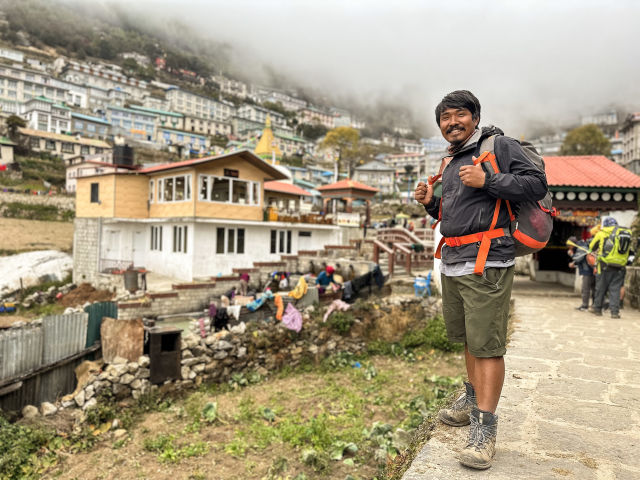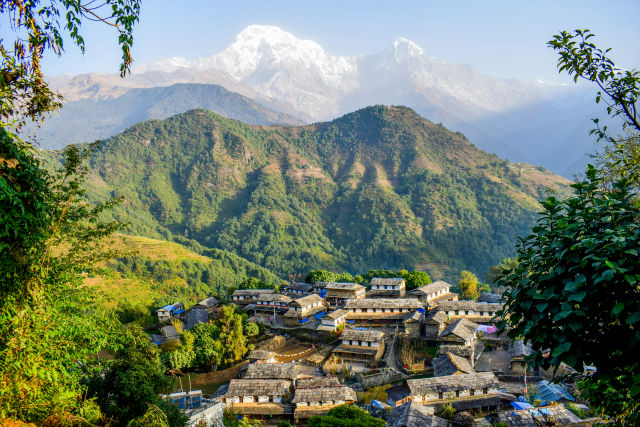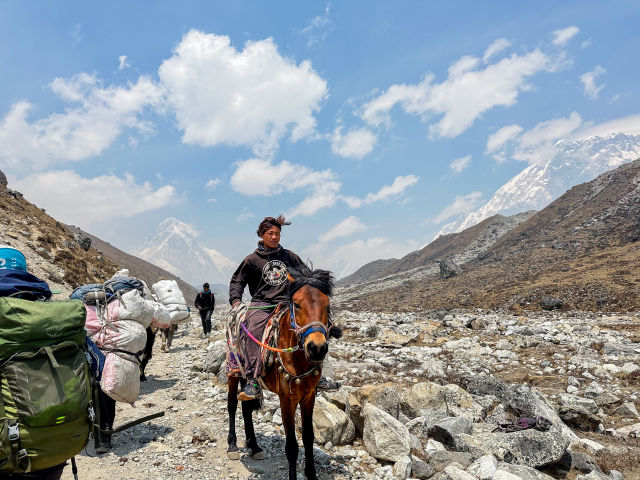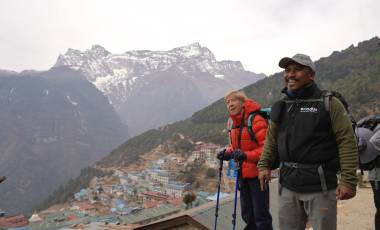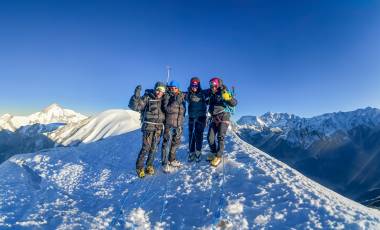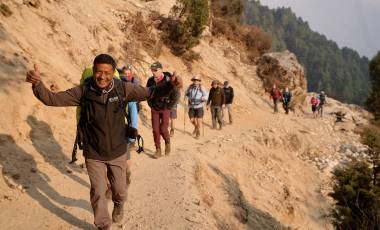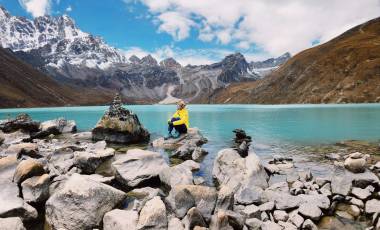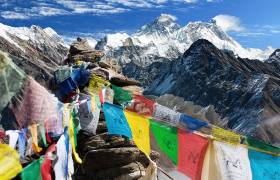I’m 70. I had a yearning to see Everest since I was quite young. As I grew older, I hoped to do the trip with my sons but the length of the trip was not conducive. I wasn’t particularly fit but trained for a few months beforehand, not knowing if I could manage the amount of walking , let alone the unknown element of altitude.
Arriving in Kathmandu, the hotel was excellent and we had time to visit the old city of Thamel.
The flight to Lukla was a great experience in a small plane, next the start of the trek.
The ‘Teahouses’ along the way offered a warm convivial welcome, with varying numbers of other trekkers present. Suspension-bridge crossings, some several hundred metres long were great! We were lucky to have clear visibility and sunshine nearly every day as we progressed ever higher amid awe-inspiring scenery, expertly led by our leader Valerie Parkinson, and Nepalese guide Saroje. Our yakman Nawang took care of all our luggage except for our light daysacks.
We gazed up at Lhotse, Ama Dablam, Macalu, Pumori, to name but a few peaks. From various vantage points including the aptly named Everest View Hotel, we had excellent views of Everest with the South Summit and South Col.
We experienced at first hand the logistical marvel of how everything is transported up here; by yak, mule, dzo or porter.
Bird-life included Vultures and Golden Eagles soaring overhead, plus Tibetan Snow birds that took a fancy to my lemon drizzle cake on Kala Patthar during our final acclimatisation trek.
After taking in the Kumbhu Glacier, we reached Gorak Shep before the final push to Everest Base Camp itself. Unlike most other treks, we had ample time at Base Camp rock before the short walk to one of the expedition camps where we stayed overnight, amongst an array of camps looking like something out of a Bond movie. We witnessed a massive avalanche, and spent time on the ice shelf, truly surreal amongst the surrounding peaks.
Overall, it was tough but an utterly amazing experience, in the competent hands of our leader Valerie, a lifetime goal achieved.

Mount Everest
Top 5 Mount Everest Highlights
Mount Everest Trips
For many, Everest Base Camp is the ultimate trekking goal, other than taking on Sagarmāthā herself. The classic Everest Base Camp trek in Nepal is a demanding climb but it should not be beyond most competent walkers. The view from Base Camp across the Khumbu Icefall and its sharp ice seracs is breath-taking. From Kala Patthar, a magnificent view of Everest’s summit can be savoured.
At 5400m, Everest Base Camp is the starting point for many of the expeditions that take on the summit – look out for our special Expedition Departures that stay at Base Camp as the teams prepare for their summit attempt.
For experienced trekkers with their sights set higher still, we offer Everest tours to the quieter Gokyo valley, adorned with a string of turquoise glacial lakes and the seldom-visited Thame Valley. These treks have the added challenge of crossing high passes, including the Cho La and the Renzo La, but also include an Everest Base Camp trek. More technical, yet still classified as a trekking peak, is Island Peak (6189m). We visit Everest Base Camp before crossing into the Dingboche valley for the summit attempt.
Please be aware that previous trekking experience is required.
Top Mount Everest Tours
Climb to Mount Everest's Base Camp with us.

The best guides in the business. Awarded GOLD by Wanderlust

Nat Geo Traveller Best Operator & British Travel Awards Best Operator for 2022

100 square metres of land Rewilded for every guest that travels

The Exodus Travels Foundation supports hard-to-reach local communities
The Annapurnas or Everest?
For years trekkers and walkers have argued about the differences between the Annapurnas and the Everest region. The simple answer is they are both spectacular yet different; the former lays claim to the Annapurna Sanctuary and the view from Poon Hill, whereas the latter has Everest Base Camp, the Sherpa heartland and the hilltop monastery at Thyangboche.
Both offer big mountain panoramas; the Everest region is perhaps more stark and rugged in appearance as most of the trekking here is above the tree line, and all of our Everest treks involve taking the mountain flight to Lukla. What you cannot escape is the fabulous warm hospitality of the Nepali people and the superb support of our experienced staff on the trek. All of our treks in the Everest region are point-to-point treks staying in the local teahouses.
Julian Pomery Everest Base Camp Trek
Jim Patti Everest Base Camp Trek – Expedition DeparturesSuch a worthwhile trip, including because of our fantastic guide Valerie Parkinson. Valerie’s knowledge and passion for the region and its people is palpable and she is also an engaging person with interesting stories about her own exploits over the years. Yes the hiking is not easy, the creature comforts are lacking and the food is (though better than expected) simple and repetitive; however, it is all part of the amazing experience of trekking to EBC. If you think you have the stamina, fitness and willingness to poop in a hole, then do this trek! And do it with Valerie if you can as having a native English-speaking guide who understands your own cultural context is so much better than a local guide.
Stephanie Tugwell Everest Base Camp TrekAbsolutely amazing trip from start to finish. Met at the airport by a smiling Tenzi Sherpa, couldn’t have had a more welcoming greeting. Thorough briefing before an early start off into the mountains. Kept fully informed all the way along the trek. Always kept upbeat by Tenzis ready smile and laugh.
Stunning scenery and totally awe inspiring to walk among the highest mountains in the world.
FAQs on Mount Everest
Can a beginner go to Everest Base Camp?
While a base camp hiking trip may not require the same level of mountaineering skill as a climb to the summit itself, we advise that you have a high level of fitness and hiking skill before you take up this exhilarating challenge. Training focuses in the months leading up to your trip should include cardio fitness and leg strength. Practise steep hikes too, if you can.
How much does it cost to tour Everest Base Camp?
The costs of our Base Camp treks vary depending on which one you choose. As a guideline, you can expect to pay from £2,500 (excluding flights). Each trek is 11-18 days long and includes the guidance of an expert tour leader, accommodation, transport, porterage, and breakfasts, among other things.
Hiking to Everest Base Camp is relatively tough, so you should make sure you’re confident in your level of fitness before you book your trip.
When you view each of our Everest Base Camp treks, you’ll find an activity level rating that gives you a better idea of the difficulty level.
You will also find a breakdown of how much distance we will cover each day and an indication of what you can expect the terrain to be like.
Whichever variation of our trek you choose, you’ll start hiking from Lukla airport and at some point in the trip, you’ll reach the Everest Base Camp and have a chance to explore it. Your group won’t be trekking up Mount Everest itself, but you’ll cover lots of ground in the surrounding region and get unforgettable views of the world’s highest mountain.
Our Mount Everest Base Camp trips include climbing neighbouring mountains, such as Kala Patthar, Gokyo Ri and Lobuje. Each is a challenge in its own right. To see specifics about trekking routes, view the itinerary on the page.
Many of our travellers ask us how long it takes to trek Everest Base Camp. Well, our base camp hikes take somewhere in the range of 12-15 days. You’ll spend around 5-9 hours walking each day, though it’s possible that your trip may include the occasional day that’s longer.
It’s important not to rush the trek, so we’ve factored in time to acclimatise to altitudes that become gradually higher the further your group progresses. One of the core principles of acclimatisation is to “climb high and sleep lower” so our routes account for this.
Each day, your trek will be anywhere from 3-12 miles long. View a breakdown of each day on the page to see specific details on the distances you’ll travel.
In any season, mountainous climates can be unpredictable, so it’s important you’re prepared for all temperatures and weathers.
With us, you can book an Everest Base Camp trekking holiday between April and November (dependent on the exact trek you select).
The pre-monsoon season takes place from March to May. You can expect temperatures to be mainly warm day and night in the lower altitudes. At Base Camp level, there is still a chance of snow during this time. There will be flowers along the route, making for lovely scenery.
From June to early September, it’s monsoon time! When you land in Lukla, you can expect to experience a lot of rain. At higher altitudes, the rainfall may be slightly lighter. It’s a quieter time for Everest Base Camp walkers because the monsoon season is less popular, but if you don’t mind the extra challenge, it can still be a rewarding trek.
The main trekking season is mid-September to November, because this is post-monsoon season and usually offers clear skies and mild temperatures. You must still be prepared for cold nights if you’re travelling in this season though. They can reach -10C at some of the higher altitudes we’ll be in.
This depends on which season you visit. In April and May, night-time temperatures of -1°C are normal. During the monsoon season, a 4°C night-time temperature is normal. If you trek with us during October to November, then expect lows of -8°C at night.
This depends on which Everest Base Camp trek you select. If Kala Patthar is on your route, you should be aware that many hikers find this quite difficult. Its elevation is 5,540 metres. From this peak, you’ll get stunning views of Everest itself, but of course, you’ll need to be physically fit enough to take on the challenge.
Expert Blog Entries
The Adventure Begins Here
Get regular inspiration straight to your inbox from Exodus’ experts.
